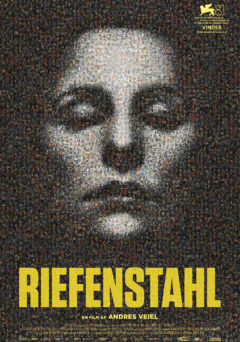Riefenstahl
På opdrag fra Hitler og Goebbels instruerede Leni Riefenstahl nogle af det nazistiske regimes vigtigste propagandafilm, ’Viljens triumf’ og ’Olympia’, som til overflod var fyldt med iscenesat kropsdyrkelse og sublim æstetik. Ved hjælp af omfattende dokumenter fra Riefenstahls dødsbo – herunder private film, fotos, optagelser og breve – tegner Andres Veiel et syleskarpt portræt af en selvmodsigende kunstner, der kæmpede med sit image og sin fortid gennem hele sit lange liv uden nogensinde at angre. Andres Veiels film havde verdenspremiere i Venedig – samme festival, hvor Riefenstahl blev fejret for ’Olympia’ i 1938.
